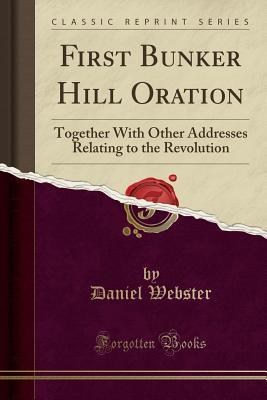- Bible
- Read the Bible
- Bible Versions
- Verse of the Day
- Reading Plans
- Verses by Topic
- Books of the Bible
- Bible Images
- Study
- Commentaries
- Concordances
- Dictionaries
- Encyclopedias
- Sermons
- Bible Atlas & Maps
- BP Wiki
- Devotionals
- Today's Devotionals
- Light of the World
- All Devotionals
- Inspirational Quotes
- More
- Picture Quotes
- Videos
- Inspirational
- Bible Study
- What The Bible Says
- Bible Q&As
- Daily Bread
- Bible by Genre
- Bible Stories
- Random Bible Verse
- Community
- Store
First Bunker Hill Oration: Together with Other Addresses Relating to the Revolution (Classic Reprint)
by Daniel Webster
Excerpt from First Bunker Hill Oration: Together With Other Addresses Relating to the Revolution
IN the uniform entrance requirements now generally adopted by our colleges, Webster's First Bunker Hill Oration is placed among the books which are to be care fully studied under the immediate direction of the teach er. It is with the purpose of marking out distinct lines for such study that this edition of Webster's famous speech has been prepared. Three others of Webster's best-known orations, dealing With kindred topics, have been added, that pupils' training may not, unless it is absolutely usees sary, be confined to the single oration prescribed.
About the Publisher
Forgotten Books publishes hundreds of thousands of rare and classic books. Find more at www.forgottenbooks.comwww.forgottenbooks.com
This book is a reproduction of an important historical work. Forgotten Books uses state-of-the-art technology to digitally reconstruct the work, preserving the original format whilst repairing imperfections present in the aged copy. In rare cases, an imperfection in the original, such as a blemish or missing page, may be replicated in our edition. We do, however, repair the vast majority of imperfections successfully; any imperfections that remain are intentionally left to preserve the state of such historical works.
IN the uniform entrance requirements now generally adopted by our colleges, Webster's First Bunker Hill Oration is placed among the books which are to be care fully studied under the immediate direction of the teach er. It is with the purpose of marking out distinct lines for such study that this edition of Webster's famous speech has been prepared. Three others of Webster's best-known orations, dealing With kindred topics, have been added, that pupils' training may not, unless it is absolutely usees sary, be confined to the single oration prescribed.
About the Publisher
Forgotten Books publishes hundreds of thousands of rare and classic books. Find more at www.forgottenbooks.comwww.forgottenbooks.com
This book is a reproduction of an important historical work. Forgotten Books uses state-of-the-art technology to digitally reconstruct the work, preserving the original format whilst repairing imperfections present in the aged copy. In rare cases, an imperfection in the original, such as a blemish or missing page, may be replicated in our edition. We do, however, repair the vast majority of imperfections successfully; any imperfections that remain are intentionally left to preserve the state of such historical works.
Paperback, 216 pages
Published May 2nd 2018 by Forgotten Books (first published September 27th 2015)
© 2025 Bibleportal.com All rights reserved.

Daniel Webster was a leading American statesman during the nation's Antebellum Period. He first rose to regional prominence through his defense of New England shipping interests. His increasingly nationalistic views and the effectiveness with which he articulated them led Webster to become one of the most famous orators and influential Whig leaders of the Second Party System.
Daniel Webster was an attorney, and served as legal counsel in several cases that established important constitutional precedents that bolstered the authority of the Federal government. As Secretary of State, he negotiated the Webster-Ashburton Treaty that established the definitive eastern border between the United States and Canada.
Webster tried three times to achieve the Presidency; all three bids failed, the final one in part because of his compromises. Similarly, Webster's efforts to steer the nation away from civil war toward a definite peace ultimately proved futile. Despite this, Webster came to be esteemed for these efforts and was officially named by the U.S. Senate in 1957 as one of its five most outstanding members.
... Show more